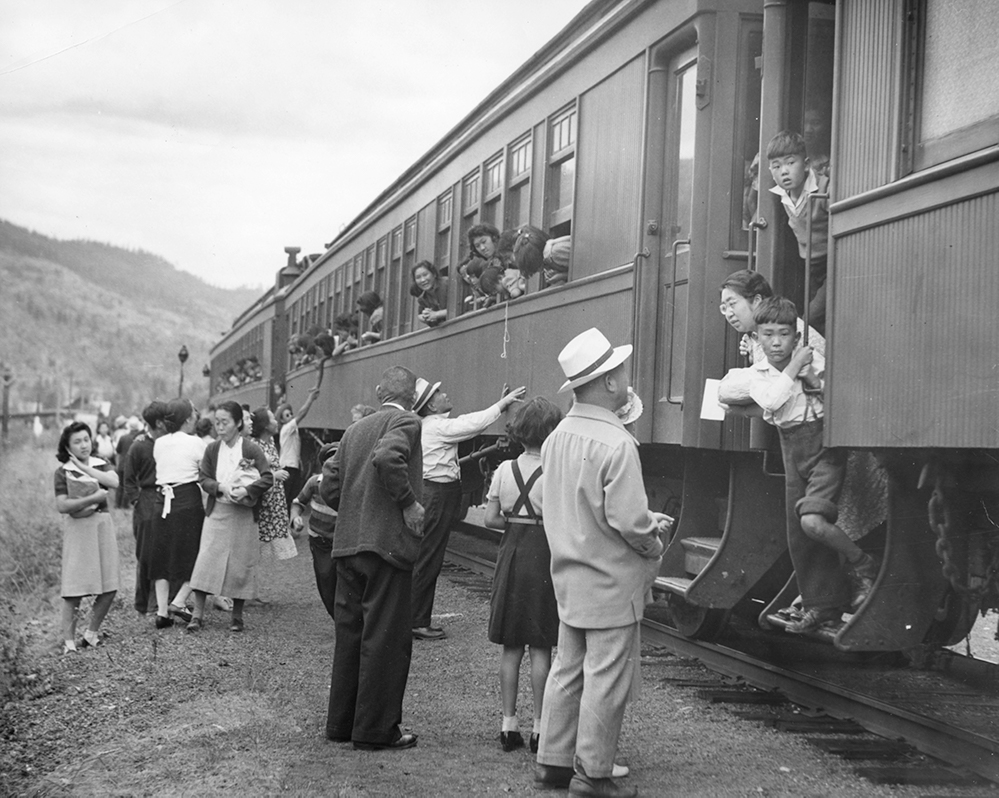1939-1952
Fair/UnFair Game
Students play a strange game in which the rules are not clear and do not seem fair.
 Scroll down
Scroll down
Why
Know
- Immigration to BC (Canada) and resulting growth of cities
- Contributions of immigrants to Canada’s development
Do
- Ask questions; gather, interpret, and analyze ideas; and communicate findings and decisions
Core Skills
- Understand interconnected aspects of cultural identity (Positive Personal and Cultural Identity)
First People’s Principles of Learning
- Learning is embedded in memory, history, and story
- Learning is holistic, reflexive, reflective, experiential, and relational (focused on connectedness, relationships and a sense of place)
How
MATERIALS
- Whiteboard or some visible place to keep score
- PowerPoint for this activity
-
Divide students into teams and tell them they will be
playing a game. Note: You might want to arrange the teams
beforehand to make sure that eye colour is distributed. One
of our test teachers, Lindsay, noticed it was really hard
for students to pick up on discrimination based on eye
colour when there were too few blued-eyed students.
- Begin the “FUF” Game: Go from team to team and have a student give a word.
- Regardless of the word, give the team five points if the player has brown eyes and take off a point if the player has blue or green eyes (but do not tell them the criteria for scoring).
- Go through a couple of rounds of this procedure and then have the teams discuss what they think the rules are. Keep playing, but increase the scoring or the penalties erratically and at your whim (e.g. give 32 points for brown eyes and take off 26 points for blue eyes). At this point students may become frustrated. This is a good thing since students experience the unfairness of the situation and the confusion of not knowing the rules.
- Eventually, tell students the rules.
- Discuss the fairness of this game and how this relates to the immigrant experience (racism, not knowing rules).
-
Ask students how they felt as they played the game and also
how they felt once they found out the rules.
- Point out the discriminatory overtones of the game because students were not judged on performance but on a physical characteristic over which they had no choice or control..
- Discuss. (See suggested questions below in Assessment Considerations.)
- Students complete journal reflection. (See suggested journal reflection prompts below in Assessment Considerations.)
Assessment Considerations
Like Beliefs, this is a baseline activity, early in the unit. Revisit students’ opinions from this activity in future lessons to enhance understanding of past discriminatory government policies and actions towards Japanese Canadians.
SUGGESTED DISCUSSION QUESTIONS
- How did it feel to not know the rules?
- Talk about what “fair” is. Fair is about being equitable, not necessarily equal or the same.
- Why is it important to have fair rules?
SUGGESTED JOURNAL REFLECTION PROMPTS
- What is it like when I don’t know the rules, but I still have to play the game? What is that like for other people?
- What is my idea of fairness (now)?
-
Write about a time when you felt you were treated unfairly
or someone you know was treated unfairly. Some sentence
starters:
- When I was…
- It was unfair when…
Extension and Variations
Classroom Charter of Rights
Build a Classroom Charter of Rights based on the Fair/Unfair Game experience and how students wish to be treated.
LinkComparing Classroom Rights with Canadian Charter of Rights
After students build their own classroom charter, they compare theirs to the Canadian Charter of Rights and Freedoms to see what they have in common and what is different.
Link